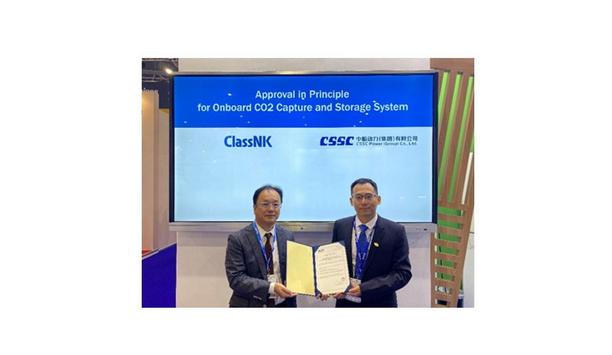CSPI - Experts & Thought Leaders
Latest China Shipbuilding Power Engineering Institute Co., Ltd. news & announcements
Tokyo-based classification society - ClassNK has issued an Approval in Principle (AiP) for an onboard CO2 capture and storage (OCCS) system, developed by China Shipbuilding Power Engineering Institute Co., Ltd. (CSPI), a member of CSSC Power (Group) Co. Ltd. (CPGC). In addition to fuel transition, interest in capturing CO2 from ships' exhaust gas is growing as a way to reduce GHG emissions, and the development of onboard systems for capturing and storing CO2 is being undertaken. ‘Guidelines for Shipboard CO2 Capture and Storage Systems’ ClassNK has published ‘Guidelines for Shipboard CO2 Capture and Storage Systems’ To encourage the development of the related technology, ClassNK has published ‘Guidelines for Shipboard CO2 Capture and Storage Systems’, including safety requirements for the systems and their installation on the ships. For a design concept of the system developed by CSPI, ClassNK conducted a review based on Part D (Machinery) of its ‘Rules and Guidance for the Survey and Construction of Steel Ships’ and ‘Guidelines for Shipboard CO2 Capture and Storage Systems’. Having verified the system drawings, risk assessment results, etc., ClassNK issued the AiP upon confirming compliance with the prescribed requirements. Onboard CO2 Capture and Storage (OCCS) System Dai Qun, the Deputy Section Chief / Senior Engineer, CPGC said, “The current global shipping decarbonisation goal is accelerating, and CPGC is actively responding to the trend by developing OCCS, which has high efficiency, high integration, and low energy consumption. The AiP of OCCS issued by ClassNK for CPGC, will provide assistance for us to achieve the transformation and development of green and low-carbon ship power.” Masaki Matsunaga, the Corporate Officer / Director of Plan Approval and Technical Solution Division, ClassNK said, “Onboard CO2 capture is one of the potential solutions for pursuing decarbonisation, along with the transition to alternative fuels. We are pleased to issue the AiP for the forward-looking design concept of the system developed by CSPI. ClassNK remains committed to supporting the realisation of innovative solutions for the decarbonisation of shipping.”
Swiss based marine engine technology developer, Winterthur Gas & Diesel Ltd. (WinGD) continues to invest in its R&D (Research & Development) testing infrastructure, with the opening of a new collaborative Global Test Centre in Shanghai, China. Global Test Centre The new test centre, which opened on the December 16, 2021, is in collaboration with CSPI (China Shipbuilding Power Engineering Institute Co., Ltd.), for the advancement of a decarbonised future, through sustainable fuel and combustion research and innovation. The role of R&D has come into sharp focus, as part of the strategy to help ships reach the International Maritime Organization - IMO’s 2050 target. The success of the industry reaching these targets relies on a focus well beyond alternate fuels. Research, innovation in future fuel propulsion solutions This new Global Test Centre will encompass research and innovation around future fuel propulsion solutions, holistic energy management systems, and power generation based on new energy converters. For the development of new technologies and products, the Global Test Centre comprises of two 2-stroke test engines and several test rigs for the validation of sub-systems such as fuel injection, pumps or gas admission valves. Development of low pressure dual-fuel technology With future demands in mind, testing will focus on new fuels, including methanol and ammonia With future demands in mind, testing will focus on new fuels, including methanol and ammonia, and on the further development of WinGD’s low pressure dual-fuel technology. The test centre will also be equipped with an electrical grid representing modern vessels, including a DC grid laboratory and dynamometers instead of water brakes, a perfectly suited infrastructure to test and demonstrate hybrid propulsion systems in the future. Commitment to accelerate the energy transition in shipping Dominik Schneiter, WinGD’s Vice President (VP) of Research & Development, said “The pace at which we need to act as an industry, to reach a carbon free future, requires all players to step up with significant commitment. By considerably expanding our test engine infrastructure, we are confirming our commitment to accelerate the energy transition in shipping.” Dominik Schneiter adds, “The future is a multi-fuel landscape where deep knowledge of the combustion properties of all fuels is required. Our collaboration with our CSSC family of companies allows us to bring the full weight of our shared expertise towards this goal.” Decarbonisation of the maritime industry is a challenge The decarbonisation of the maritime industry is a global challenge that requires collaboration and collective efforts, at unprecedented levels. The combination of WinGD’s proven expertise of 2-stroke engine efficiency with low emissions and the technology innovation capabilities of the China Shipbuilding Power Engineering Institute Co., Ltd., will result in future integrated power solutions that will help reach zero emissions.


